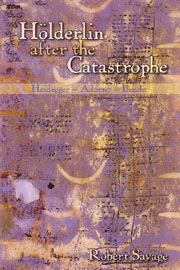Book contents
Foreword
Published online by Cambridge University Press: 05 February 2013
Summary
WHAT CAN A GERMAN UNDERSTAND about Hölderlin?” The Hölderlin experts to whom this question was addressed had no doubt been expecting a more diplomatic overture from the man who posed it, Pierre Bertaux, when they invited him to appear as guest speaker at their 1968 conference. That he should begin his speech by casting doubt on their own interpretative credentials amounted to a slap in the face. In itself, the fact that they were being lectured by a foreigner on this, the most German of poets, was unusual enough. It was a moot point and, since the early twentieth century, a well-worn topos of reception, whether the work of Friedrich Hölderlin (1770–1843) even tolerated translation, whether it did not rather flout the criterion of universal communicability and intelligibility upon which any act of translation depends. Conventional wisdom suggested that no matter how diligently a non-German were to delve into the poetry's language, intertextual borrowings, historical background, or symbolism, its essential meaning would always elude him. By inverting the standard reproach, Bertaux sought to transform what had hitherto been regarded as an insurmountable barrier to understanding — the brute fact of exclusion from a tribe that still defined membership according to the ius sanguinis — into its prerequisite. Yet even he insisted upon the privilege of nationality, maintaining that his own insights accrued to him solely by virtue of his impeccable revolutionary pedigree. Where such arguments were put into play, the counter-accusation of Gallic arrogance was not far off.
- Type
- Chapter
- Information
- Hölderlin after the CatastropheHeidegger - Adorno - Brecht, pp. ix - xiiPublisher: Boydell & BrewerPrint publication year: 2008



